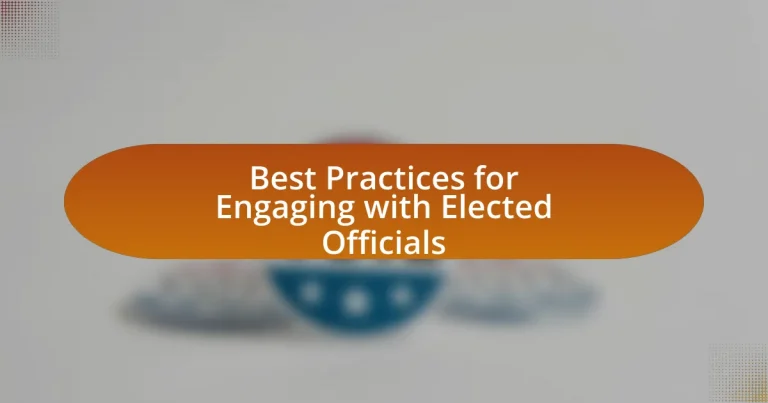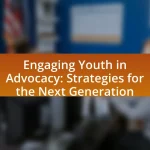The article focuses on best practices for engaging with elected officials, emphasizing the importance of being informed, respectful, and clear in communication. It outlines strategies for effective engagement, including building relationships, understanding officials’ priorities, and utilizing direct communication methods. The article also discusses the significance of timing in outreach efforts, the impact of citizen engagement on policy-making, and common pitfalls to avoid. Additionally, it provides practical tips for preparing for meetings, articulating concerns, and leveraging resources to enhance advocacy efforts.
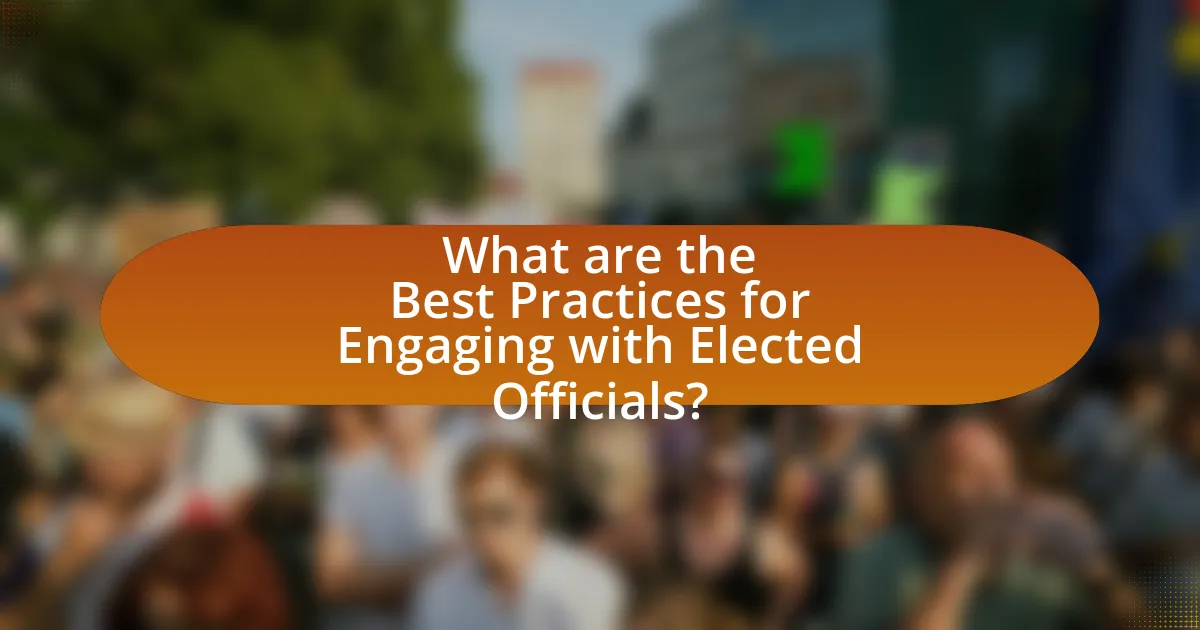
What are the Best Practices for Engaging with Elected Officials?
The best practices for engaging with elected officials include being informed, respectful, and clear in communication. Engaging effectively requires understanding the official’s priorities and the issues at hand, which can be achieved by researching their positions and recent actions. Respectful communication fosters a positive relationship, while clarity ensures that your message is understood. For instance, a study by the National Conference of State Legislatures highlights that constituents who present well-researched arguments are more likely to influence legislative decisions. Additionally, personal stories can make a compelling case, as they humanize the issues and resonate emotionally with officials.
Why is it important to engage with elected officials?
Engaging with elected officials is important because it allows citizens to influence policy decisions that affect their lives. When constituents communicate their needs and opinions, elected officials are more likely to consider these perspectives in their legislative actions. Research indicates that direct engagement can lead to more representative governance; for instance, a study by the Pew Research Center found that 70% of Americans believe that contacting their representatives can make a difference in policy outcomes. This demonstrates that active participation fosters accountability and responsiveness in government.
What impact does citizen engagement have on policy-making?
Citizen engagement significantly enhances policy-making by fostering transparency, accountability, and responsiveness in government actions. When citizens actively participate in the policy-making process, they provide valuable insights and diverse perspectives that can lead to more informed and effective policies. Research indicates that communities with higher levels of citizen engagement experience better governance outcomes, as evidenced by a study from the National Civic League, which found that engaged citizens are more likely to report satisfaction with local government services and policies. This engagement not only helps to align policies with the actual needs of the community but also builds trust between citizens and elected officials, ultimately leading to more sustainable and equitable policy outcomes.
How can engagement influence elected officials’ decisions?
Engagement can significantly influence elected officials’ decisions by shaping their understanding of constituents’ needs and priorities. When constituents actively participate in discussions, provide feedback, and advocate for specific issues, elected officials are more likely to consider these perspectives in their decision-making processes. For instance, studies have shown that public engagement initiatives, such as town hall meetings and surveys, can lead to policy changes that reflect the community’s desires, as officials seek to align their actions with the interests of their voters. This responsiveness is often driven by the desire to maintain electoral support and legitimacy, demonstrating that effective engagement can lead to more representative governance.
What are the key strategies for effective engagement?
Key strategies for effective engagement with elected officials include building relationships, being informed, and communicating clearly. Building relationships involves establishing trust and rapport through consistent interaction, which can lead to more productive discussions. Being informed means understanding the issues at hand, the official’s stance, and the broader political context, allowing for more meaningful conversations. Communicating clearly entails articulating your message succinctly and effectively, ensuring that your points are understood and resonate with the official. These strategies are supported by research indicating that personal connections and informed dialogue significantly enhance advocacy efforts and influence decision-making processes.
How can individuals prepare for meetings with elected officials?
Individuals can prepare for meetings with elected officials by researching the official’s background, current issues, and relevant legislation. This preparation allows individuals to engage in informed discussions and articulate their concerns effectively. For instance, understanding the official’s voting history and public statements can help tailor the conversation to align with their interests or priorities. Additionally, preparing specific questions or points of discussion ensures that the meeting remains focused and productive. According to the National League of Cities, effective preparation can significantly enhance the impact of advocacy efforts, leading to more meaningful interactions with elected officials.
What communication methods are most effective in engaging officials?
Direct, clear, and concise communication methods are most effective in engaging officials. These methods include face-to-face meetings, personalized emails, and structured phone calls, which facilitate direct interaction and allow for immediate feedback. Research indicates that personal interactions, such as meetings, foster stronger relationships and enhance trust, as evidenced by a study from the National League of Cities, which found that 70% of officials prefer in-person communication for discussing important issues. Additionally, tailored messaging that addresses specific concerns or interests of the officials increases engagement, as highlighted in a report by the Pew Research Center, which shows that personalized communication leads to higher response rates.
What role does timing play in engaging with elected officials?
Timing is crucial in engaging with elected officials as it influences the likelihood of a successful interaction. Engaging during key legislative periods, such as before a vote or during budget discussions, increases the chances that officials will prioritize the concerns presented. For instance, research shows that advocacy efforts are most effective when aligned with the legislative calendar, as officials are more receptive to input that can impact immediate decisions. Additionally, timely engagement can capitalize on public sentiment or emerging issues, making the communication more relevant and impactful.
When is the best time to reach out to elected officials?
The best time to reach out to elected officials is during their constituent outreach periods, typically when they are back in their home districts, which often occurs during recesses from legislative sessions. This timing allows constituents to engage with officials in a more accessible environment, as they are not preoccupied with legislative duties. Additionally, reaching out early in the legislative process, such as before key votes or discussions on relevant issues, increases the likelihood of your concerns being considered. Research indicates that constituents who engage during these periods have a higher chance of influencing policy decisions, as officials prioritize feedback from their local communities.
How can current events influence the timing of engagement?
Current events can significantly influence the timing of engagement with elected officials by creating urgent issues that demand immediate attention. For instance, during a public crisis, such as a natural disaster or a significant legislative debate, constituents may find that their concerns resonate more strongly with officials, prompting quicker responses. Historical examples include the rapid mobilization of advocacy groups during the COVID-19 pandemic, where public health concerns led to increased communication with lawmakers to address urgent needs. This demonstrates that the context of current events can dictate when and how effectively constituents engage with their representatives, as officials are often more receptive to issues that align with pressing societal concerns.
How can constituents build lasting relationships with elected officials?
Constituents can build lasting relationships with elected officials by actively engaging in consistent communication and demonstrating support for their initiatives. Regularly attending town hall meetings, providing feedback on policies, and participating in community events fosters a sense of connection and trust. Research indicates that constituents who maintain ongoing dialogue with their representatives are more likely to influence decision-making processes, as evidenced by a study from the National Democratic Institute, which found that 70% of elected officials value constituent input in shaping legislation.
What are the benefits of establishing a rapport with elected officials?
Establishing a rapport with elected officials enhances communication and fosters collaboration on community issues. This relationship allows constituents to effectively advocate for their needs, ensuring that their voices are heard in policy-making processes. Research indicates that when constituents engage positively with their representatives, it leads to increased responsiveness and support for local initiatives, as evidenced by studies showing that elected officials are more likely to prioritize issues raised by constituents they know personally. Additionally, a strong rapport can facilitate access to resources and information, enabling more informed decision-making and community engagement.
How can follow-up actions strengthen these relationships?
Follow-up actions can strengthen relationships with elected officials by demonstrating commitment and fostering ongoing communication. When constituents engage in follow-up actions, such as sending thank-you notes or providing additional information on issues discussed, they reinforce their interest and investment in the relationship. Research indicates that consistent communication enhances trust and rapport, which are essential for effective advocacy. For instance, a study by the National Institute for Lobbying and Ethics found that regular follow-ups can lead to increased responsiveness from elected officials, thereby solidifying the relationship over time.
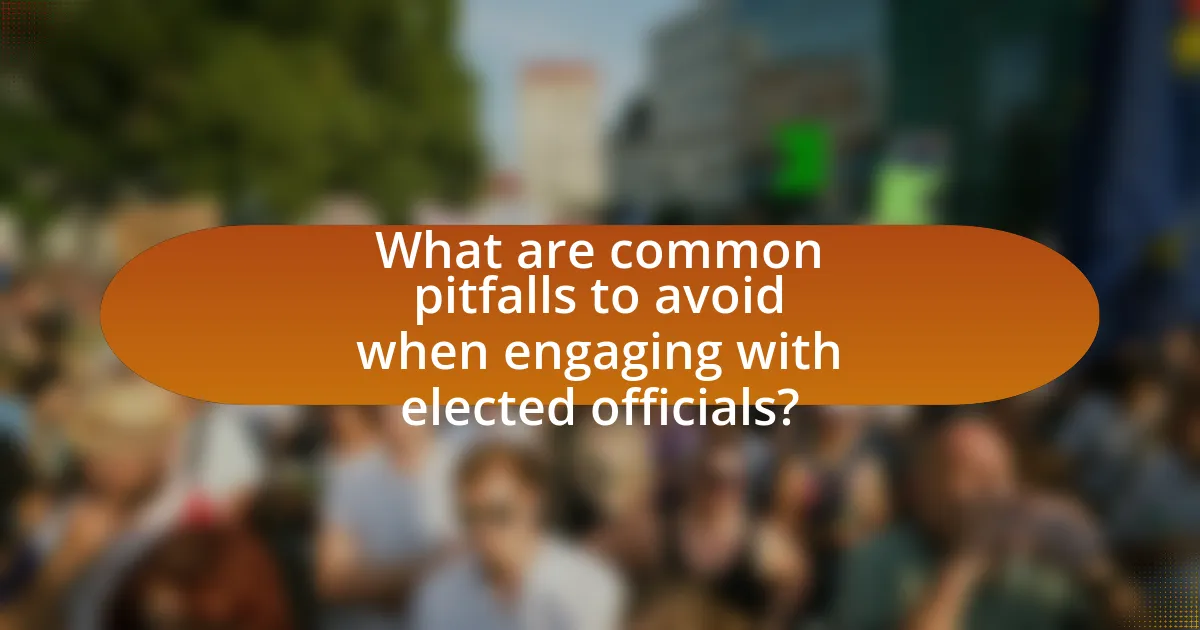
What are common pitfalls to avoid when engaging with elected officials?
Common pitfalls to avoid when engaging with elected officials include lack of preparation, failure to understand the official’s priorities, and poor communication. Engaging without adequate research can lead to ineffective discussions, as officials prioritize issues that align with their agendas. Additionally, not tailoring the message to the official’s interests can result in disengagement. Clear and concise communication is essential; lengthy or overly complex messages can dilute the main points and lose the official’s attention. Furthermore, neglecting to follow up after initial contact can diminish the impact of the engagement, as it may signal a lack of commitment or interest in the issues discussed.
What mistakes do constituents often make in their approach?
Constituents often make the mistake of not being well-informed about the issues they are advocating for. This lack of knowledge can lead to ineffective communication with elected officials, as constituents may present arguments that are not grounded in facts or current policies. For instance, a study by the Pew Research Center found that only 39% of Americans could accurately identify their congressional representatives, indicating a gap in engagement and understanding. This disconnect can hinder productive dialogue and diminish the impact of their advocacy efforts.
How can overstepping boundaries harm the engagement process?
Overstepping boundaries can significantly harm the engagement process by eroding trust and damaging relationships between constituents and elected officials. When individuals or groups disregard established limits, it can lead to feelings of discomfort or resentment among officials, making them less receptive to future communication. Research indicates that effective engagement relies on mutual respect and understanding of roles; for instance, a study by the National League of Cities highlights that clear boundaries foster productive dialogue and collaboration. Therefore, maintaining appropriate boundaries is essential for sustaining a positive and effective engagement process.
What are the consequences of being uninformed about issues?
Being uninformed about issues can lead to poor decision-making and ineffective engagement with elected officials. When individuals lack knowledge about relevant topics, they may support policies that do not align with their interests or values, resulting in negative social, economic, or political outcomes. For instance, a study by the Pew Research Center found that informed citizens are more likely to participate in civic activities and advocate for policies that reflect their needs, while uninformed individuals often disengage from the political process altogether. This disengagement can perpetuate a cycle where elected officials prioritize the interests of informed constituents, further marginalizing those who are uninformed.
How can constituents effectively handle disagreements with elected officials?
Constituents can effectively handle disagreements with elected officials by engaging in respectful dialogue and presenting well-researched arguments. This approach fosters constructive communication and increases the likelihood of being heard. For instance, constituents should prepare specific examples of how policies impact their community, as evidenced by studies showing that personal stories resonate more with policymakers. Additionally, utilizing formal channels such as town hall meetings or written correspondence allows constituents to articulate their concerns clearly and formally, which is supported by data indicating that organized advocacy efforts lead to more responsive governance.
What strategies can be used to express dissent respectfully?
To express dissent respectfully, individuals can utilize strategies such as active listening, using “I” statements, and focusing on specific issues rather than personal attacks. Active listening involves fully engaging with the other person’s perspective, which fosters a respectful dialogue. Using “I” statements allows individuals to express their feelings and opinions without sounding accusatory, thereby reducing defensiveness. Focusing on specific issues rather than personal attacks helps maintain a constructive conversation. Research indicates that respectful communication can lead to more productive discussions and better outcomes in civic engagement, as highlighted in studies on conflict resolution and effective communication strategies.
How can constructive criticism lead to better outcomes?
Constructive criticism can lead to better outcomes by providing specific, actionable feedback that helps individuals or organizations improve their performance. When feedback is framed positively and focuses on behaviors rather than personal attributes, it encourages a growth mindset, fostering an environment where individuals feel safe to learn and adapt. Research indicates that organizations that embrace constructive criticism experience higher levels of employee engagement and productivity, as employees are more likely to implement changes that enhance their work quality. For instance, a study published in the Harvard Business Review found that teams that regularly engage in constructive feedback sessions outperform those that do not, demonstrating the tangible benefits of this practice in achieving better results.
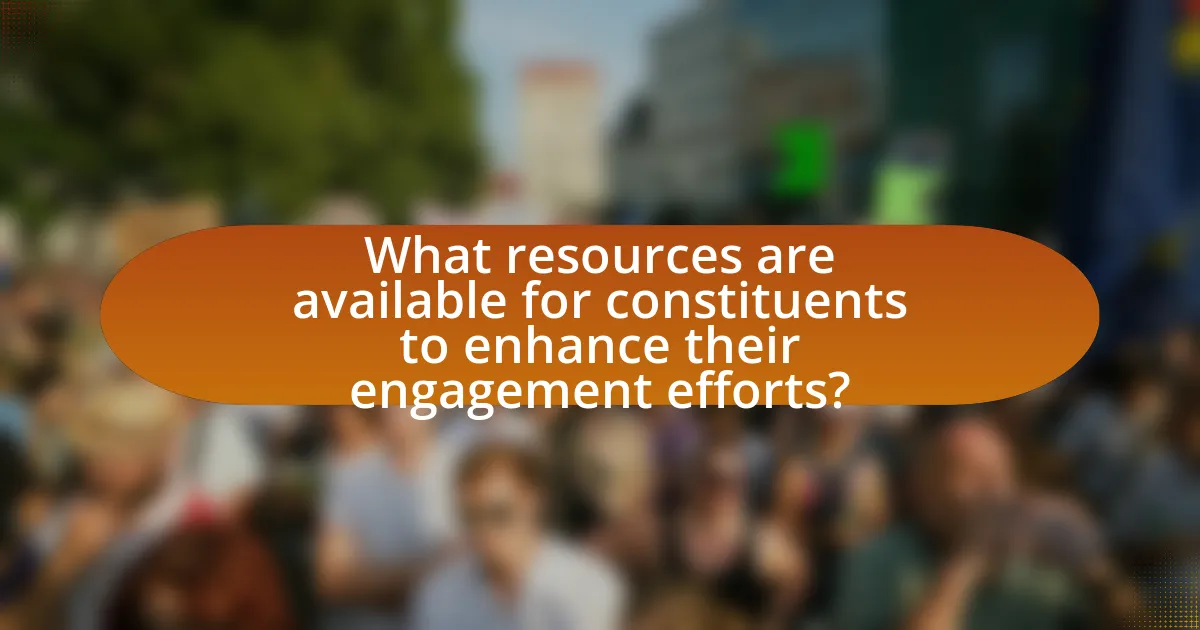
What resources are available for constituents to enhance their engagement efforts?
Constituents can enhance their engagement efforts through various resources such as community organizations, advocacy groups, and online platforms. Community organizations often provide training sessions and workshops that equip constituents with skills for effective communication with elected officials. Advocacy groups frequently offer toolkits that include templates for letters, phone scripts, and strategies for organizing campaigns. Online platforms, including social media and dedicated civic engagement websites, facilitate direct communication and mobilization efforts, allowing constituents to share their concerns and connect with others who share similar interests. These resources collectively empower constituents to engage more effectively with their elected representatives.
What tools can help individuals track their elected officials’ activities?
Tools that can help individuals track their elected officials’ activities include websites like GovTrack.us, which provides information on congressional activities, and VoteSmart.org, which offers details on politicians’ voting records and public statements. These platforms aggregate data from official government sources, ensuring accuracy and reliability. For real-time updates, platforms like Twitter and Facebook can also be useful, as many elected officials share their activities and positions directly with constituents. Additionally, mobile apps such as Countable allow users to follow legislation and communicate with their representatives, enhancing civic engagement.
How can social media be leveraged for engagement?
Social media can be leveraged for engagement by facilitating direct communication between constituents and elected officials. Platforms like Twitter and Facebook allow officials to share updates, respond to inquiries, and gather public feedback in real-time. According to a 2021 study by the Pew Research Center, 69% of adults in the U.S. use social media, making it an effective tool for reaching a broad audience. Engaging content, such as polls and live Q&A sessions, can further enhance interaction, as evidenced by a 2020 analysis from the Harvard Kennedy School, which found that posts encouraging public participation significantly increased engagement rates.
What organizations provide support for citizen engagement initiatives?
Organizations that provide support for citizen engagement initiatives include the International Association for Public Participation (IAP2), the National Civic League, and the Center for Civic Design. These organizations offer resources, training, and frameworks to enhance public participation in governance. For instance, IAP2 promotes best practices in public participation through its core values and training programs, while the National Civic League focuses on fostering civic engagement through community-based initiatives and awards. The Center for Civic Design emphasizes user-centered design in civic engagement tools, ensuring that initiatives effectively meet the needs of citizens.
What are some practical tips for successful engagement with elected officials?
To successfully engage with elected officials, individuals should prioritize clear communication, establish a respectful relationship, and provide relevant information. Clear communication involves articulating specific issues or requests concisely, which helps officials understand the concerns of their constituents. Establishing a respectful relationship can be achieved by acknowledging the official’s role and responsibilities, fostering a collaborative atmosphere. Providing relevant information, such as data or personal stories, supports the argument and demonstrates the importance of the issue, making it more compelling for the official to consider. These strategies enhance the likelihood of productive interactions and influence decision-making processes.
How can individuals effectively articulate their concerns and needs?
Individuals can effectively articulate their concerns and needs by clearly defining their message, using specific examples, and maintaining a respectful tone. Clear communication involves stating the issue directly, such as “I am concerned about the lack of affordable housing in our community.” Specific examples, like citing local statistics or personal experiences, strengthen the message, for instance, “According to the recent housing report, 30% of residents spend over 50% of their income on rent.” Maintaining a respectful tone fosters constructive dialogue, which is essential for engaging with elected officials. Research indicates that respectful communication increases the likelihood of a positive response from policymakers, as demonstrated in studies on civic engagement and public discourse.
What are the best practices for writing letters or emails to officials?
The best practices for writing letters or emails to officials include being clear, concise, and respectful. Clarity ensures that the official understands the purpose of the communication, while conciseness respects their time. Respectful language fosters a positive relationship and encourages a constructive response.
Additionally, it is important to include specific details such as the issue at hand, relevant facts, and a clear call to action. For instance, referencing specific legislation or policies can strengthen the argument and demonstrate informed engagement. Using a professional tone and proper formatting, such as a formal greeting and closing, further enhances the effectiveness of the communication.
Research indicates that personalized messages are more likely to receive responses, as they show genuine interest and effort. According to a study by the Congressional Management Foundation, constituents who personalize their communications are 20% more likely to receive a reply from their elected officials.
